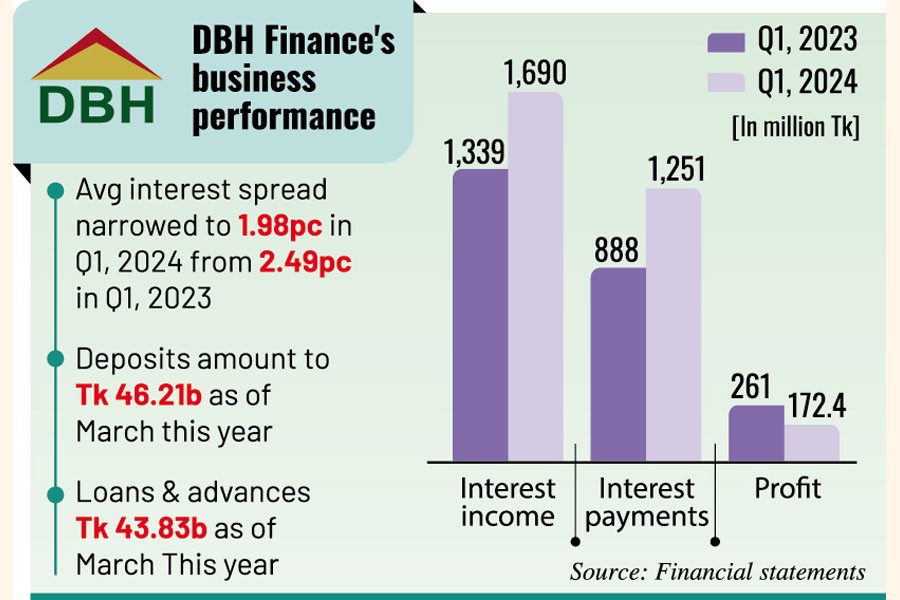DBH Finance's profit plunged 34 per cent year-on-year to Tk 172.4 million in the first quarter of this year for higher interest payment on deposits and shrinking income from the stock market.
The company, which is focused on home loans, witnessed its interest payment and operating expenses go much higher than earnings in January-March this year, compared to the same period a year ago.
While interest income was up 26 per cent year-on-year in the quarter, interest payment to depositors and lenders jumped 41 per cent. As a result, net interest income slimmed down.
DBH Finance's average interest spread being narrowed to 1.98 per cent in the first quarter of this year from 2.49 per cent in the same quarter last year also explains the sharp decline in profit.
On the other hand, operating expenses rose 4.5 per cent year-on-year to Tk 164 million in the quarter through March as the managing director's salary and allowances soared more than 62 per cent.
Meanwhile, higher provision against capital market investments due to price erosion of major stocks also negatively impacted the quarterly financial outcome, said a company official.
Non-bank financial institutions are required to keep 100 per cent provision against stock market investments.
In its earnings note, DBH said that since blue-chip stocks fell after the withdrawal of floor price, it had to set aside Tk 86.4 million in provision against stock investments, which was 9.4 percent of its total investments in listed securities.
Major stocks such as Grameenphone, Robi Axiata, BAT Bangladesh, Renata, United Power, and Walton saw their stocks move down on the bourses by 16-43 per cent until Monday since the removal of the price restriction in January this year.
The company's investment in the capital market stood at around Tk 920 million as of March this year.
Its net operating cash flow per share turned Tk 1.86 in the negative for January-March this year as against a positive value of Tk 7.93 (restated) in the same quarter a year earlier.
The company said loan disbursement increased by Tk 500 million in the quarter to March, compared to the same period a year earlier, while it had Tk 1.55 billion less in deposits in the quarter, compared to a year ago.
DBH Finance, formally known as Delta Brac Housing Finance Corporation, has been driving the growth of the real estate sector by helping clients fulfill their dreams of owning a home through credits.
Its 2023 annual profit dropped by 3 per cent year-on-year to Tk 985 million and the company declared 15 per cent cash dividends for shareholders.
Meanwhile, DBH stock slid 1.04 per cent to Tk 38 per share on the Dhaka Stock Exchange on Monday from the previous session. It plunged 33 per cent after the removal of the price restriction.
DBH issues bonds
In January this year, DBH received approval of the Bangladesh Securities and Exchange Commission (BSEC) to issue non-convertible coupon-bearing senior bonds worth Tk 3.5 billion.
With a five-year maturity period, the bonds were issued to the International Finance Corporation (IFC), aimed at facilitating affordable housing for middle-income individuals.
Company secretary Jashim Uddin earlier said the company planned to lend money especially to those having a monthly income below Tk 100,000 for purchasing flats or houses.
Currently, DBH Finance is taking deposits at 9.04 per cent to 9.44 per cent and disbursing loans at interest rates ranging from 11 per cent to 11.46 per cent.
DBH opens Islamic Financing Wing
In May 2023, the company introduced Shariah-compliant deposit and housing financing products and services in all of its 14 branches located in major cities of the country simultaneously, with existing operations.
DBH has always been able to keep the operating cost down and mobilise funds at relatively lower costs due to its excellent market reputation.
That enables the company to remain competitive in the market.
The management has been able to contain non-performing loans (NPLs) below 1 per cent as of total loans it has disbursed, which keeps loan-related provisions at a lower level.
Source: The Financial Express
